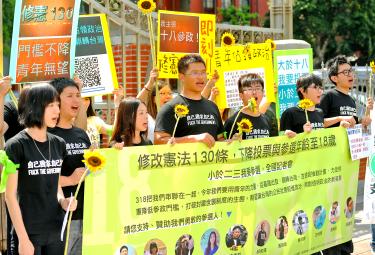A group of people under the age of 23 yesterday called for an amendment to the Constitution to allow political participation by younger people and panned the electoral system for blocking the economically vulnerable from running for office by requiring a security deposit.
More than a score of young people, with an average age of 19, protested outside the Legislative Yuan in Taipei yesterday against restrictions that they said discriminate against youth political participation by setting the minimum voting age at 20 and the minimum candidate age at 23.
Many of them have attempted to register as “potential candidates” in the year-end local elections at local election commissions on Monday — the first day of the five-day period for candidate registrations — but were rejected, the group said.
Shan Yi-che (冼義哲), one of the initiators of the “youth occupation of politics” campaign, said in the meantime they would take an approach in line with the existing regulations, which is petitioning, filing administrative litigation and seeking an interpretation of the Constitution.
“We are also calling on the legislature to squarely face the issue of young Taiwanese being excluded from the political field,” the 22-year-old Shan said. “Our history textbooks proclaim that the Republic of China is the first democratic republic founded in Asia, but Taiwan is now probably the most backward democracy in the world, as Japan, one of the last two democracies with a minimum voting age of 20, lowered the voting age [for national referendums] to 18 [in June].”
However, their age was not the only problem they encountered when they tried to register as candidates; in fact, officials at the commissions took issue with them about money, the group said.
“I was told by a section chief surnamed Yang (楊) at Tainan City’s election commission that ‘registration is like going to hostess clubs; having fun with hostesses requires money, and so does registration,’” 22-year-old Tainan city councilor aspirant Wu Chia-en (吳嘉恩) said.
“We are here demanding an apology from him and asking Tainan Mayor William Lai (賴清德) to impose a disciplinary penalty [on the official],” Wu said.
Another official at Taoyuan’s election commission also characterized the deposit as the most essential criterion, telling a councilor aspirant that the commission only reviews the completeness of the documentation, and “if the completeness is fulfilled with the required security deposit, we would accept the application even if it was from a three-year-old child.”
A Kaohsiung councilor aspirant, also rejected by the commission on the basis of money rather than age, said the regulation amounted to discrimination against the economically vulnerable, accusing Taiwan’s democracy of descending into a money game of the inherited rich and powerful.
“The five special municipalities require a deposit of NT$200,000 for a councilor candidate; for other cities it is NT$120,000. The deposits are not returned if you do not reach a certain ballot threshold,” said 21-year-old Chiu Bo-wei (邱柏瑋), a Chiayi councilor aspirant.
Taiwan Solidarity Union Legislator Chou Ni-an (周倪安) also attended the protest, voicing the party’s support for lowering the threshold for youth political participation.
He said the party would propose public-funded political campaigns and lowering the vote threshold for a seat in the Legislative Yuan from 5 percent to 1 percent to allow small parties to gain legislative representation.
Source: Taipei Times - 2014/09/03





















